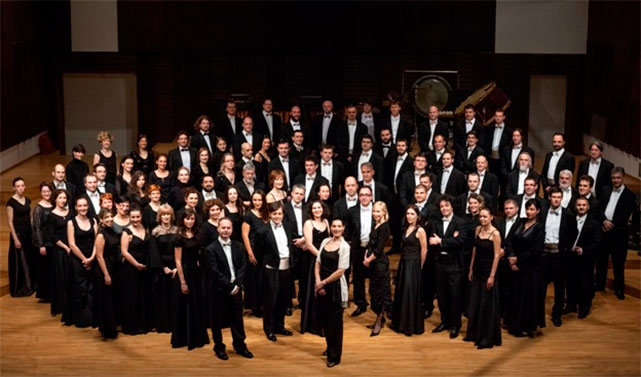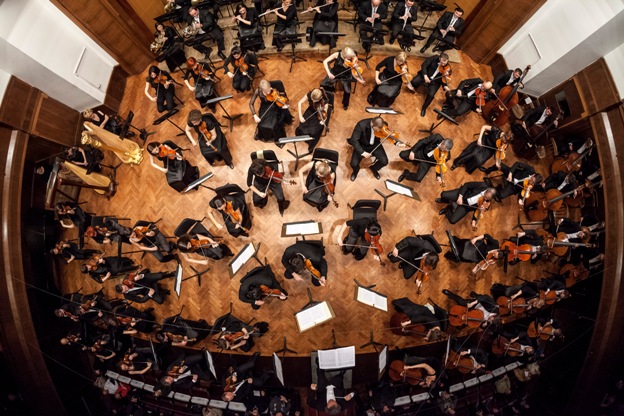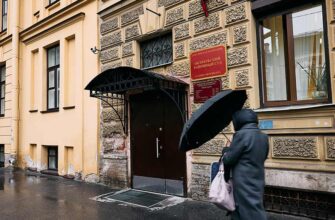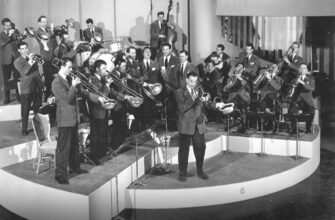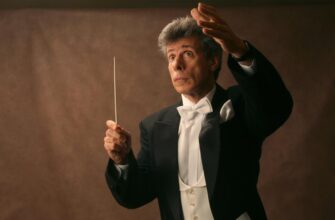One of the best European orchestras – Belgrade Philharmonic (or in brief BPO) – will give a concert in Moscow at Concert Hall Chaikovsky on September 06, 2016. The BPO will be a guest of Moscow state academic Philharmonic. The program of the concert contains three creations: Aram Khachaturian Concert, Symphony “From The New World” by Antonín Dvořák and Fantasy on Serbian themes by Nikolai Rimsky-Korsakov.
The conductor of the orchestra is world-famous Daniel Raiskin (born in Leningrad, USSR), who now works with the best orchestras throughout Europe. The violin will sing in the hands of Nemanja Radulovic, who is named as “Young God of the violin” and now working for Deutsche Grammophon.
Russian musicians are well-known in Serbia and collaborate with BPO. Serbian musicians are less known in Russia if you go beyond the circle of musicians and connoisseurs. Our article aims at informing the Russian public about the wonderful orchestra and Serbian music lovers in general.
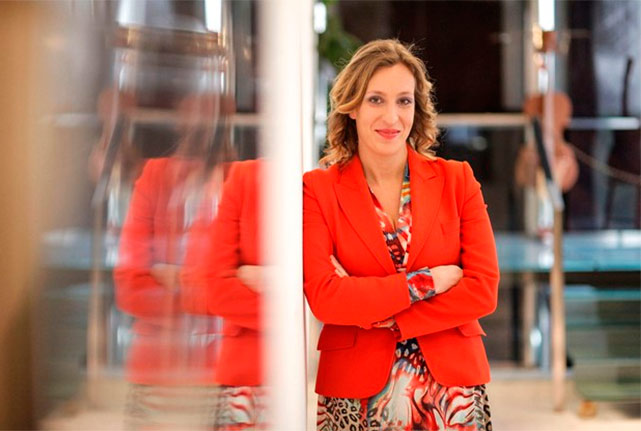
We asked questions of Belgrade Philharmonic to its PR manager Jelena Milašinović and propose you to read her interview.
E Vesti: BPO has a lot of contacts and examples of collaboration with musical Russia as well as with Balkan, European and other countries. What international contacts are the most active now and what current international cooperation examples you can mention?
Jelena Milašinović: The Belgrade Philharmonic Orchestra has established itself as the leading national orchestra in the region and a gust of fresh air on the international concert scene.
In previous seasons, the orchestra has cooperated with leading international conductors and soloists, including Zubin Mehta, Mikhail Jurowski, Krzysztof Penderecki, Sir Neville Mariner, Boris Berezovsky, Gerhard Oppitz, Nelson Freire, Fazil Say, Andrei Gavrilov, Julian Rachlin, Sarah Chang, Isabelle Faust, Mischa Maisky, David Geringas, Sol Gabetta, duo Igudesman and Joo, Vadim Repin, Nikolai Lugansky, Steven Isserlis and many others.
One of the orchestra’s most important collaborations has been the friendship with Maestro Zubin Mehta, who gave benefit concerts with the Belgrade Philharmonic Orchestra over the past several years. The most important goal of the orchestra’s 5-year planning period is to establish and consolidate its position on the international music scene, especially overseas. Belgrade Philharmonic has established good relations in US, Middle East (Oman), last European tour Orchestra has undertook was in 2014, and it included concerts in Switzerland and Germany. After Moscow concert BPO will perform in Budapest, in Palace of Arts (MUPA).
E Vesti: Who are the starts of BPO now? We know it is difficult to underline, but kindly try to name 3 megastars…
Jelena Milašinović: Most of the musicians of Belgrade Philharmonics concluded professional education in famous music centers, for example – concertmaster of BPO, Tijana Milošević completed specialist studies at Juilliard School of Music. Ognjen Popović, (clarinet) earned the Master degree at the Hochschule für Musik und Theater München. Sanja Romić, principle oboe received further training at the Mozarteum as well as principle celloist Nemanja Stanković. All of them perform in BPO with world class soloists and conductors. In concert season 2016/17 we will welcome big stars such as Fasil Say, Giovani Sollima, Akiko Suwanai, Mikhail Jurowski, Zoltan Kocis…
E Vesti: Whose idea was to prepare programs “for lovers”, “for beginners”, “for connoisseurs” and “for adventurers”? We find the idea is excellent.
Jelena Milašinović: The Belgrade Philharmonic Orchestra has become known for its creative programming and adventurous, even provocative marketing.
By taking an innovative approach to the selection of concert series BPO considerably increased the number of its subscribers. For example, the concert series titled Bizarrte, launched in the season 2012/13, was highly popular with younger audiences. Its title is a blend of the words bizarre and art, which implies unusual repertoire, concepts and instruments and it aims to target different groups as well as to attract new people to the concert hall. In the BPO’s Bizarrte series, the audience had a chance to see and hear water percussions, an alphorn player as a soloist, trombone imitating the sound of a motorcycle, recycled garbage used as musical instruments, monumental Turangalila-Symphony for piano and ondes Martenot, as well as multitasking artists – one as a conductor and pianist and another as a double soloist on two different instruments. In season 2015/16 Bizarrte altered into series titled For the Adventurers.
Creative and innovative program concepts unconventionally counterbalanced by elements of traditional repertoire are one of the main characteristics of the artistic approach and the relation between the Belgrade Philharmonic and its audience. As a result of these efforts, the Belgrade Philharmonic is the leading orchestra in the region and beyond, with sold out tickets for several months in advance.
E Vesti: Is this tour to Russia is the first one in 2000s?
Jelena Milašinović: Yes, it is, and musicians of BPO are very excited and proud to perform in temple of music such Tchaikovsky Concert Hall is. Back in the history, there were two tours in USSR 1963 and in 1978. Last time BPO performed in Moscow was in 1995.
E Vesti: What is current state of the Belgrade Philharmonic? There were difficult times in its history…
Jelena Milašinović: The years of conflict in the Balkans, in the 1990s, drove the Belgrade Philharmonic to the margin of European concert activities. As there were practically no funds for culture, working conditions deteriorated, so the institution also faced serious technical problems. The period starting with the bombing of Serbia in 1999 and stretching until 2001, was surely one of the grimmest in the history of the Belgrade Philharmonic.
In 2001, the fortunes of the Belgrade Philharmonic took a brighter turn with the appointment of Ivan Tasovac as Director of the Orchestra. Mr. Tasovac held this position until 2013.The radical shift in the functioning of the institution was made and the work of the orchestra, which gradually put the Belgrade Philharmonic back on the map of major European orchestras. This trend also included a generational shift among the musicians. By raising the quality of its interpretations, the Belgrade Philharmonic Orchestra considerably increased the number of its subscribers and enriched its repertoire by introducing pieces previously unheard by the Belgrade audience, as well as new compositions shortly after their world premiere. Belgrade once again became attractive for renowned international artists, such as Zubin Mehta, Nigel Kennedy, Renaud and Gautier Capuçon, Mischa Maisky, Nikolai Lugansky, Krzysztof Penderecki, Sir Neville Marriner, Sarah Chang, Sol Gabetta, Barry Douglas, Jean-Yves Thibaudet, Simon Trpčeski, Igudesman&Joo, Julian Rachlin. During this period, the orchestra considerably enhanced institutional and regional cooperation. As a result of these efforts, and creative approach in programming, the Belgrade Philharmonic is the leading orchestra in the region and beyond, with sold out tickets for several months in advance.
E Vesti: In Russia there is a growing interest to classics. What happens in Serbia in general (you have concerts in regions and in Belgrade)?
We can say there is growing interest to classics in Serbia as well. Back then, before Balkan crises, it was part of our basic education. Now we are getting back on the almost same track as before. Moreover, people became tired of cheap instant pleasures served by mass media, they are turning back to genuine experience which classic music can offer them always. Belgrade Philharmonic is serving to that idea! Main characteristic of BPO is positive energy and passion which is pulsating, which is always attractive for audience.
E Vesti: The Philharmonic has an educational branch too, providing lectures for children. Is it popular now among young Serbians? (we know in Moscow Philharmonic there is a record sales of such tickets)
Jelena Milašinović: Since we aspire to nurture our concert audience since their very early age, we organise series of children’s concerts twice a year.
Children’s programmes involve elements of actual symphonic concerts, featuring a full-sized orchestra on the stage, a conductor and a standard symphonic repertoire, as well as an actor taking the role of the narrator with a view to introducing the youngsters into the world of classical music in a way that is tailored to their interests. The costumes, illustrations, instrument presentations and the games we play are some of the ways in which we are trying to bring children closer to symphonic music.
The month of October is reserved for preschool children, whereas the programmes organised in March target the pupils of primary school grades I–IV. These two periods are the merriest parts of our concert seasons, when we are delighted to welcome more than 2000 children in the Belgrade Philharmonic Hall over ten days.
Musical awareness and learning programs for children is one of the Belgrade Philharmonic’s strategic goals and a project in which we have invested great efforts. With the idea of introducing kids to the world of classical music in a way that is amusing to them and suited to their age we designed concert series for preschool and school children. Smaller Belgrade Philharmonic ensembles often visit kindergartens in Belgrade, allowing youngsters to have direct contact with the musicians and instruments.
Moreover, the Belgrade Philharmonic Orchestra rehearsals are open for children once a month, when they can also take part in interactive workshops with the orchestra musicians.
